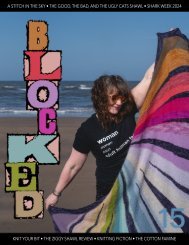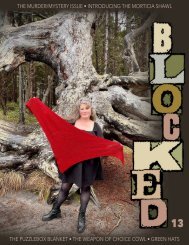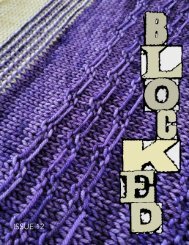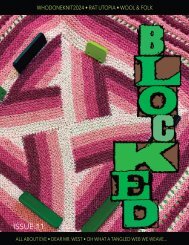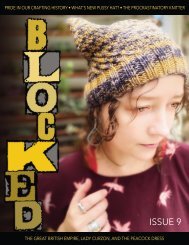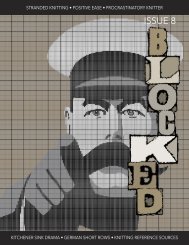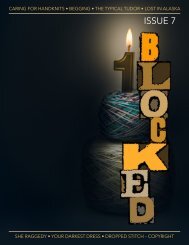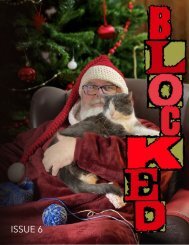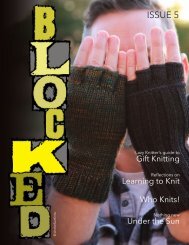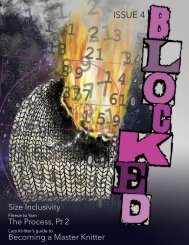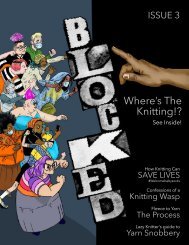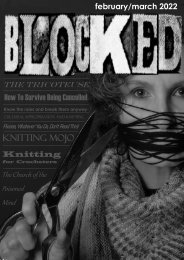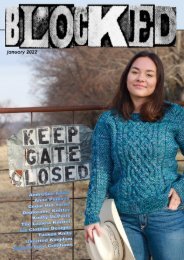blocked_10_final
Create successful ePaper yourself
Turn your PDF publications into a flip-book with our unique Google optimized e-Paper software.
Banned Books Continued...<br />
Requests to remove books from a library go<br />
through a multi-step process. However, the first step<br />
typically starts with a complaint by a patron. A librarian<br />
will listen to the patron’s concern and will proceed<br />
through a few steps, depending on the type of library.<br />
The item may be removed immediately from the collection<br />
because it violates the library’s mission (i.e. an anti-<br />
Catholic book in a Catholic school library); if this is not<br />
the case, patrons are typically asked to fill out a form<br />
detailing their objection to the material.<br />
If a patron fails to complete the “challenge request”<br />
form, then the challenge process ends and the material<br />
will stay in the collection. Even if the patron doesn’t escalate<br />
the request to the level of filling out paperwork, a<br />
bored librarian can still fill out the ALA’s Challenge Reporting<br />
form. The ALA uses a deceptively simple form<br />
for reporting and recording challenges (ALA, 2023), so<br />
a challenge recorded in the ALA’s “banned books” statistics<br />
can be as simple as a verbal complaint that a<br />
book shouldn’t be in the children’s collection because it<br />
contains nudity.<br />
If a patron goes through the process of filling out a<br />
written request, a panel of library board members will<br />
review the request and then form a decision on<br />
whether or not to remove the title. Book removal<br />
requests and outcomes are reported to the ALA voluntarily,<br />
so the true accuracy of their statistics is unknown.<br />
(ALA, 2023)<br />
I think most of us will agree that a book about building<br />
bombs and making bullets isn’t appropriate for a<br />
school library; however, the waters tend to get a little<br />
murky when we start talking about sexual content. The<br />
ALA's current top <strong>10</strong> most challenged books are all<br />
geared towards teens/young adults, and are challenged<br />
based on explicit sexual content and/or sexual<br />
abuse. (ALA, 2023) The top 50 most “banned” books<br />
are nearly all books that are geared toward children<br />
and teens. (Martin, 2022)<br />
While I wholeheartedly agree that censorship is<br />
bad, I am also a firm believer in age appropriateness.<br />
The appropriateness lines are becoming ever more<br />
blurred and the ALA is completely tone deaf when it<br />
comes to the concerns of parents. (Kennedy, 2022)<br />
How vulgar or graphic does something written for children<br />
have to be to not receive the blessing of the ALA?<br />
The ALA disparages parent advocacy groups and<br />
lists them as the cause of the rise in book challenges,<br />
yet they offer no solutions to concerned parents. (ALA,<br />
2023) “Trigger warning.” “Explicit lyrics.” “This film contains<br />
content that may not be suitable for children.”<br />
Most of us have seen content warnings like these on<br />
films, music, and even YouTube videos, but when it<br />
comes to books it is still the Wild West. My child can’t<br />
purchase a copy of Texas Chainsaw Massacre at the<br />
local Wal-Mart, but she can check out books with<br />
graphic depictions of sex acts from a school library.<br />
I have chosen not to include excerpts from the most<br />
controversial titles, but if you would like to know what a<br />
lot of parents find so objectionable you may simply<br />
Google: “explicit passages in ‘All Boys Aren’t Blue’.”<br />
WARNING: NSFW<br />
The American Library Association is not an unbiased<br />
organization. They do have a very liberal progressive<br />
agenda. (Kennedy, 2022) When there was a lot of uproar<br />
earlier this year over celebrated children’s author,<br />
Roald Dahl’s, work being censored to remove “offensive”<br />
language (Diaz, 2023), there was no great outcry<br />
from the American Library Association (ALA). They also<br />
weren’t particularly worried when the Seuss estate decided<br />
to withdraw books from print because they were<br />
deemed “insensitive.” (Villagomez, 2021)<br />
Obviously, if books are being censored for reasons<br />
that the ALA agrees with, then there is no cause for<br />
alarm. (Andrew, 2021) While the ALA thinks graphic<br />
sexual content is suitable for children, and doesn’t merit<br />
a content warning or parent permission, Kaitlin Frick, in<br />
her blog post for The Association for Library Service to<br />
Children, writes that library staff should attach racism<br />
discussion guides to racially “problematic” classic<br />
books, like Little House on the Prairie. (Frick, 2020) “She<br />
also suggests librarians encourage parents to check out<br />
anti-racist books or more inclusive titles along with a<br />
classic book.” (Andrew,<br />
2021)<br />
You might be further<br />
dismayed to learn why<br />
there are, likely, no “conservative”<br />
books on the<br />
banned books list, even<br />
though we’ve been living<br />
through one of, arguably,<br />
the most divisive political<br />
and social climates of the<br />
past 50 years. The reason,<br />
quite simply, is gatekeeping.<br />
Johnny the Walrus by Matt Walsh was, undoubtedly,<br />
a very controversial book released in 2022 (Migdon,<br />
2021); the book sold nearly <strong>10</strong>0,000 copies in the first<br />
two months of its release. Yet, it did not appear on the<br />
ALA’s banned book list, why not? Maybe everyone just<br />
thought the book was great, and there wasn’t a single<br />
challenge…doubtful. A catalog search of the Chicago<br />
Public Library returns 0 results for Johnny the Walrus<br />
(they have 4 copies of The Anarchist Cookbook). I live<br />
13




